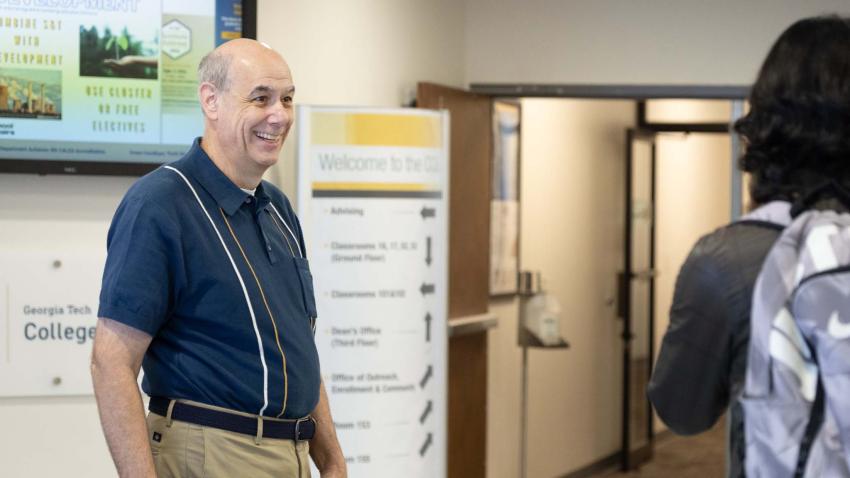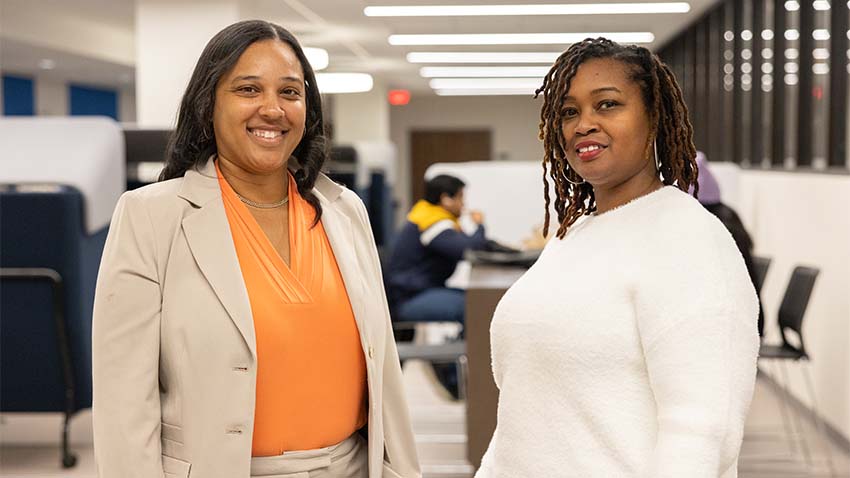
New Initiatives Shape the Future of Career Services in Computing
This Fall, the College of Computing welcomed Paul Fowler as director of career services. With a strong background in student development and a Ph.D. in higher education administration, Fowler brings years of leadership experience and passion to his role.
"I'm thrilled to be here and excited about focusing all my energies on CS students," Fowler said. "The opportunity to do that full-time and build a program around them was too good to pass up."
A Comprehensive Approach to Student Development
The College’s strategy for career services extends beyond traditional models, emphasizing comprehensive professional development. The goal is to empower students to define their career paths by aligning their skills, interests, and values. This approach is supported by collaboration between faculty, career services, and industry partners, who work together to ensure that students are prepared for long-term success.
"Our goal is that students aren’t here because they think it’s a good major, or they’re going to make a lot of money, or their parents said they need to be here. They’re here because this is their passion," Fowler said.
The process begins with first-year students and continues through graduation, focusing on internships, co-ops, and research experiences.

VIP Career Fair and Expanded Programming
As part of this comprehensive approach, several new programs have been introduced to better prepare students for the evolving job market.
A standout feature is VIP access to the upcoming career fair, which offers early entry to students who complete three key assignments: researching companies, learning how to use Exponent (a new technical interview tool), and reviewing the policy on accepting job offers. This early access gives students an edge in networking with top employers.
School of Computing Instruction (SCI) Chair Olufisayo Omojokun sees this as a strategic move to prepare students for conversations with various companies at the career fair.
“Ultimately, it’s about connecting our students to jobs. And it’s not just about large household names but also small companies that might offer the best career paths for students to grow into leadership roles early in their careers,” Omojokun said.
Integrated Career Support and Tech-Enhanced Advising
The College is deepening its commitment to career readiness by directly embedding support into the curriculum and enhancing in-person and virtual resources.
Integrating career services into the first-year curriculum, particularly through collaborations like the one with SCI’s Kris Nagel in CS1100, ensures that students are introduced early to essential professional development tools. Workshops will be offered early in the semester, and students will benefit from an overhauled advising process that offers guidance throughout their academic journey.
“We’ve overhauled advising so it’s going to be more intentional with first-year students in terms of what they need to know right away,” Fowler said.
Additionally, a new website and Canvas page will provide real-time updates, resume-building tools, and access to recorded workshops, offering students continuous support as they progress toward their professional goals.

While the College strengthens its internal career support, it is also actively engaging with the broader industry landscape, addressing key challenges such as the impact of artificial intelligence (AI).
Addressing Critical Industry Questions
The computing field faces complex challenges, particularly with the rise of AI. "There are a lot of questions being raised in the computing career space," Omojokun said. "How many developers or software engineers does a company actually need? What is the role of AI in that question?"
The College aims to address these industry shifts through expanded partnerships with employers and by staying informed on trends that impact job availability and skills demand.
Fowler emphasized that career success isn’t just about securing a job but finding the right fit. His goal is for students to "graduate with THE job and THE company doing exactly what they want to do.”
A Focus on Lifelong Professional Growth
As the College of Computing looks to the future, Fowler’s initiatives are poised to help students secure jobs and thrive in their professional lives.
“My goal is to create young professionals who will be successful, not just in their first job, but throughout their careers,” he said.
As computing revolutionizes research in science and engineering disciplines and drives industry innovation, Georgia Tech leads the way, ranking as a top-tier destination for undergraduate computer science (CS) education. Read more about the college's commitment:… https://t.co/9e5udNwuuD pic.twitter.com/MZ6KU9gpF3
— Georgia Tech Computing (@gtcomputing) September 24, 2024


